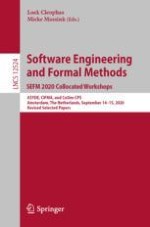2021 | OriginalPaper | Buchkapitel
The Intensional Structure of Epistemic Convictions
verfasst von : Reinhard Kahle
Erschienen in: Software Engineering and Formal Methods. SEFM 2020 Collocated Workshops
Aktivieren Sie unsere intelligente Suche, um passende Fachinhalte oder Patente zu finden.
Wählen Sie Textabschnitte aus um mit Künstlicher Intelligenz passenden Patente zu finden. powered by
Markieren Sie Textabschnitte, um KI-gestützt weitere passende Inhalte zu finden. powered by
